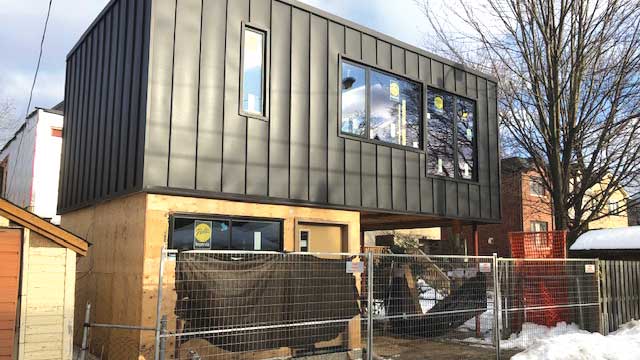
Last month’s Leaside Life mentioned the recent approval of garden suites, “as of right,” carte blanche across the city. But while City Council passed the bylaw on February 3rd, it was not unanimous (our Councillor Jaye Robinson was one of five who voted against), and subsequently six residents’ associations, scattered across the four districts, plus the Confederation of Resident and Ratepayer Associations (CORRA) appealed the legislation to the Ontario Land Tribunal. In addition, an alliance called “Building Better Neighbourhoods” has formed to support responsible renewal of communities. The rules that will govern the way forward need to result in stable communities maintaining character and function, recognizing the need for more housing options, but steering clear of the creation of expensive housing and profitability for developers.
The appellants state that the City clearly overreached provincial regulations limiting garden suites to single detached, semi-detached, and townhouses in extending its approval to multiplexes. They believe there is no legal authority, nor is it good planning, to allow garden suites in zoning for multiplexes and low-rise apartments without development of appropriate standards. Several residents’ associations (including LRA) had raised concerns in submissions to City Planning, and the Planning and Housing Committee, but their planning concerns and specific recommendations that would improve the regulations, quality of life for present and future residents, and better protect existing trees and green space, were left unaddressed in the legislation, disregarded in the apparent rush to get the legislation adopted and implemented before the pending close of Council’s term in July.
Originally, garden suites were claimed to be a solution to the housing crisis and part of efforts to improve housing affordability, but lately that argument has been toned down to one of “increasing housing options.” Based on evidence from laneway suites, rents for garden suites can range between $3,000 and $5,000, and the greatest interest is coming from investors. In Toronto, almost one in three houses is purchased by investors. This poses the very real risk of destabilizing our housing market. Here’s why:
• Investors and speculators compete with individual home buyers for the limited supply of homes, so the price of a home will skyrocket.
• At the size currently proposed, the rents that would be generated from a garden suite would not be considered affordable.
• Individual home buyers who are already struggling to keep up with the rising cost of housing will find themselves priced out of the market.
There is a risk of neighbourhoods transitioning from being owner-occupied to investor-owned. There is evidence of this following the introduction of garden suites in Barrie, Ont. Barrie later changed the entire scope of their garden suite bylaws because streets were changing from resident to investor ownership, with home prices and rents both rising to unaffordable levels.
Originally, garden suites were claimed to represent “gentle density” that did not negatively impact the streetscape – because they were in the backyard, hidden behind the street wall. However, the City-approved policy allows the primary dwelling to be demolished in order to build the garden suite behind, thus deflating that argument and raising the spectre of an increase in demolitions.
Other issues raised by residents and residents’ associations include:
• Height (too tall) and minimum setbacks from the primary dwelling (too little) giving rise to issues of shadowing, and loss of soft landscape and reduction in permeable surface area.
• Density (floor space index measure) is not a performance measure for garden suites so neighbourhood intensification can no longer be reliably tracked.
• Allowing basements in garden suites increases the potential damage to tree roots and endangers tree health.
• “One size fits all” minimum performance standards, despite the varied lot sizes and characteristics, and built form typologies in neighbourhoods across the city.
• “As of right” approval for garden suites that meet minimum performance measures prevents neighbours from being advised of the application, and having their say via a notice and hearing at the Committee of Adjustment.
These are the issues those following the matter have raised – but it’s also the case that few know about this. The City has held virtual meetings, made a video, and created a survey reaching a few thousand people at most across Toronto. None of the meetings has been ward-based and promoted at the neighbourhood level. Recently (but after the policy’s approval), such a meeting was held in one ward. Again, a garden suites policy could have been developed without these flaws.
Garden suites interrupted? Hopefully, the City will use this appeal process to start a real dialogue on the current one-size-fits-all framework being forced on communities across Toronto. In the meantime, please share your views with Councillor Jaye Robinson.


